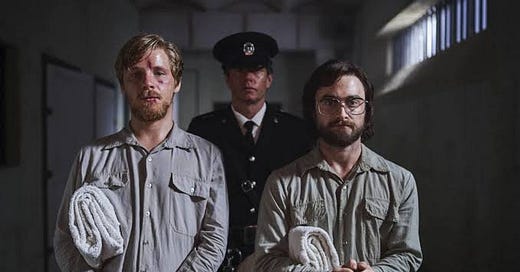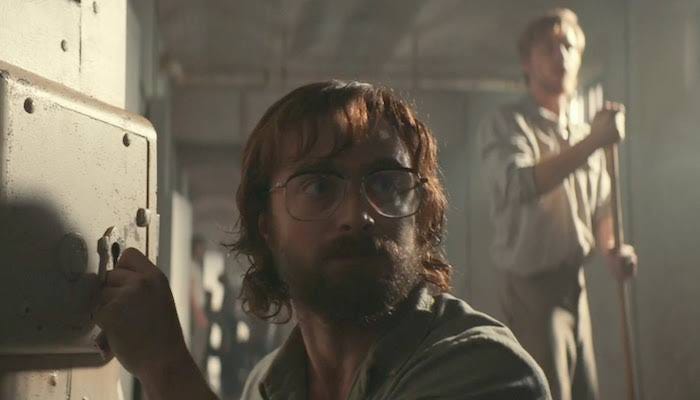ideas are more dangerous than guns.
what escape from pretoria teaches us about freedom & oppression
Mom and my two younger brothers are watching Escape from Pretoria (2020) and every two or three minutes, I tell my youngest brother to keep quiet. He's self-appointed commentator-cum-enquirer but I want him to watch solemnly.
Escape from Pretoria tells the story of two white activists1 in apartheid South Africa who are arrested and convicted for spreading literature criticizing the government's racist policies. Viewing their imprisonment as an infraction against good conscience and true justice, with the help of fellow inmates, they plan, execute and succeed at one of the most publicized prison escapes in South African history. (No spoilers ahead!)
I believe everyone should watch this movie: it is the triumph of the human spirit, a testament to the gospel that no chains anywhere can cage a man's will. These men were stripped of their freedoms and dignity, shut out of familial and societal life for the mere fact that they believed that all men should be treated equally, and that personhood was far beyond skin colour.
They were punished for an intellectual crime; they didn't tout guns or attempt a coup. They just preached "dangerous" ideas. Ideas that threatened the foundations of an unjust society. Their crime was for thinking a thing, and expressing it.
Movies like Escape are important, not because we want to thrill ourselves to the high-stakes cinematic suspense (the movie is a masterclass on the execution of breath-holding, lung-bursting scenes), and not only because they are true stories and make for good history education.
Escape is a poignant reminder of the blessed privilege of democratic freedoms. In movies like these, we are ferried to see worlds primitive in the authoritarianism of their governments in the stifling of expression, and we cringe. It teaches us to never through silence or inaction, be accomplices of these evils. They are time capsules, mirrors, of what even our well-developed societies can devolve into. They remind us of the power of ideas—how seductively simple they are, yet how they are the sand and cement of whole societies.
the power of ideas
We need to deeply investigate the ideas we profess and cherish. They mean something. They mean everything. The difference between a country where a man cannot vote, own a business or aspire to lead because his skin is melanated and one where skin colour is as meaningful as the colour of the sky or of sand is … an idea. Taught, built on.
These ideas in society are octopus-like, their tentacles stretching over everyone and everything, influencing personal attitudes and steering far-reaching governmental policy.
This is why public discourse is important, that the ideas we proffer can be publicly and thoroughly scrutinized. If they can't stand up to public scrutiny, we have every reason to suspect it.
What are you hiding? Why are you hiding it?
Bad ideas cannot survive under the light. Like that weed, mimosa pudica, they shrivel—folds their leaves when you touch or step on it. Evil thrives in the shadows, in the secrecy. This is why censorship doesn't kill off bad ideas (and actors) but ironically fuels them. It cloaks them in mystery and intrigue, the twin irresistible levers of curiosity.
Censorship will push a bad idea to the fringes, into the arms of anti-establishment groups—out of mainstream view where they can be effectively challenged and discredited. When the establishment gags an idea, it is a sweet signal that makes for an attraction: if they don’t like this, then maybe there's something worth seeing for us.
The way to fight bad ideas is not through suppression but through public disapproval. Let the people see its flaws and let them argue it to the ground. Let the weight of reason crush it.
This here is an idea. Deceptively simple. Free speech and the freedom of expression.
democracy is an egg …
Our democracy is a simple idea: that the aristocrat in the poshest parts of Ikoyi2 and the poor fisherman paddling in the creeks of Opobo3 are the same. They deserve the same treatments. When aggrieved, they can both approach the same courts. They can both lend their voices to the larger issues. They can choose their leaders through elections.
This idea is deceptively simple.
But it is at the core of our immense socio-political machinery. It is the reason that if they can afford it, both men—the aristocrat and fisherman—can own property anywhere in Nigeria, can run for office, can access education. Both men are allowed to do anything.
I do not say they are no barriers at all, but any limitations should rise from their personal abilities, not government-sanctioned discrimination.
It goes further to say that the greatest investment in the promotion of a just society is in the education of the people. An ignorant people will lack the skills to engage larger societal issues. A hungry people? They will be too occupied with fending for their children to bother about "public discourse". A malnourished people, starving of either physical or intellectual nourishment would be mistrusting of their governments. As they watch the leaders well-fed at their expense, any attempts at interaction or engagement will fall on deaf ears. They won’t see leaders. They will only see protruding bellies and lips glistening with palm oil.
This is why bad governments deliberately refuse to educate their people. They would rather rule over slaving zombies than critical citizens. Good governments, on the other hand, build formidable allies in their people.
It is why the activists in Escape fought with bucket bombs, non-lethal contraptions that hurled printed pamphlets into the air. Since government controlled the media—one of the most effective means of public discourse—they retorted with explosive dissemination. On streets, in marketplaces. “For where two or three are gathered together … [truth would be there] in the midst of them4”.
the price of freedom?
In all, Escape boldly encourages us to fight for our ideas, to fight back against oppression and injustice. There is a price for freedom—stark and painful. Those men risked life and limb in their attempts to escape political prison, evade a government and run from their countries, away from their friends, comrades and their families grieving outside those heavily-guarded walls.
If we live in democratic societies, each one of us has a responsibility to uphold these values, to stand for the rule of law and equality before the law. In every space we occupy, we should not only believe, but embody these precepts.
If we live in undemocratic societies, we owe our families, our children, and ourselves, freedom. A breath of fresh air.
There is nothing like it.
It is the deepest ache of the human spirit—and what else can sate it?
I hush my youngest brother for the 15th time? He's just six, and to his young eyes, the movie is "American" people in uniform, talking and walking in the screen. They are poking huge padlocks with sticks and they are speaking in hushed tones. There is quiet thanks in my heart.
My father was around his age when the Nigeria-Biafra civil war started and anytime I hear of war, I imagine how witnessing such a perturbance at a young age can be psychologically scarring. I pray it never comes close. Idealistically, I pray all wars end, that people everywhere can experience freedom.
He can't understand it now but I hope he will. He will watch this movie again when he's older and maybe, he will read this too.
with love & ink,
emmanuel
Daniel Radcliffe as Tim Jenkin and Daniel Webber as Stephen Lee
Ikoyi is “ … arguably one of the wealthiest communities within Nigeria” — Wikipedia
I do not mean offence. Subsistence fishing is one of the main occupations of riverine towns in Southern Nigeria.
Paraphrasing of Matthew 18:20 (KJV)







i feel you.
I would have loved to comment on this, but I am trying to steer clear of anything that has political inclination. It always causes some form if anger.